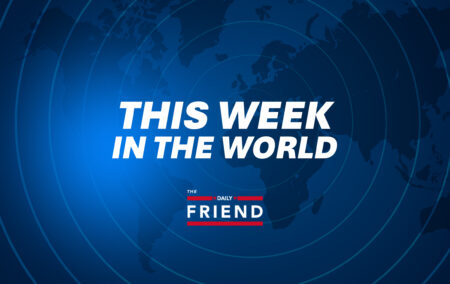This Week in the World sheds light on events and personalities around the globe that may not have made the headlines
Ukraine-Russia
Since the beginning of the full-scale invasion of Ukraine in 2022, Western countries have imposed a host of sanctions on Russia in an effort to hurt its economy and limit its weapons production.
One of the targets of these sanctions has been Western computer chips which are needed to produce advanced weapons like missiles. According to Ukrainian intelligence, more than half of all components used in Russian long-range missiles are made in the United States.
The Russian defence industry and economy has been quite effective in circumventing these sanctions by importing these parts via third countries. As a result, the trade of many European countries like Germany with Central Asian countries such as Kyrgyzstan has skyrocketed, as these countries have become transit points for sanctioned goods headed for Russia. The trade is often facilitated through Chinese companies operating in Central Asia.
A report in The Moscow Times suggests that this circumvention has not been without costs. The newspaper reports that the intermediary companies are significantly raising their prices, forcing Russian buyers to pay more than twice as much as they normally would.
In another story on Russia’s difficulties with sanctions, The Moscow Times reports that due to Russia being cut off from access to the global financial system, the country recently had to conduct a trade with Pakistan without currency, bartering chickpeas and lentils in exchange for rice and mandarin fruit instead.
This week, according to the Kyiv Independent, the General Staff of Ukraine claimed that it had destroyed a Russian “Nebo-M” radar station using American-supplied HIMARS missiles. If true, this would be a significant setback for Russian air defence. These systems are incredibly valuable, estimated at over $100 million, and far from plentiful; it is estimated that Russia only has 10 of these systems.
On 1 October, Russia captured the town of Vuhledar, site of some of the largest tank battles of the war so far. The capture of this town is the most significant Russian success since the fall of the Ukrainian town of Avdiivka in February this year.
Middle East
On Friday 27 September, Israel carried out a major strike on the capital of Lebanon, Beirut. The target was a bunker, at which a meeting was taking place, attended by much of the senior leadership of the Shia militia and political party, Hezbollah, including its leader of 32 years, Hassan Nasrallah.
Announcements by both Israeli and Hezbollah sources confirmed that Nasrallah was killed in the strike. His death is a major blow to Hezbollah and a major complication for Iran. Nasrallah had been described as Israel’s arch enemy. Nasrallah was a key part of the 2006 war between Israel and Hezbollah and also played a major role in the Syrian civil war, deploying Hezbollah troops to save the government of Bashar al-Assad in 2013. During his tenure he massively expanded Hezbollah’s army, and increased its rocket arsenal to become one of the largest rocket stockpiles in the world.
Hezbollah, which is closely aligned with Iran in ideology and organisation, has been a key part of Tehran’s foreign policy. While Iran has sought to develop nuclear weapons, Hezbollah has acted as a deterrent to Israel, so that if Israel ever struck Iranian nuclear facilities, Iran could order Hezbollah to launch a full-scale attack on Israel, which would be difficult for Israel to resist. The air campaign against Lebanon-based militia by Israel since the end of September has crippled much of Hezbollah, which so far has not been able to retaliate significantly.
As a result, in an effort seen as attempting to warn off the Israelis and buy some breathing room for Hezbollah, Iran launched a major missile attack on Israel on 1 October. Targets across Israel were hit, but the scale of damage seems to have been greatly reduced by air defence, with assistance from US and UK air forces. An Israeli airbase was struck, but Israel claims that the damage was not significant enough to affect operations. There was only one reported casualty, a Palestinian man who was struck by falling missile debris in the West Bank.
Israeli Prime Minister Benjamin Netanyahu responded to the attack by saying that Iran had made a “big mistake” and would “pay for it”. Speculation in the military-analyst community suggests that Israel may retaliate by targeting Iran’s oil and nuclear facilities.
In a report in The Atlantic, Arash Azizi suggests that Iran is ill prepared for a full-scale conflict with Israel. Azizi quotes an Iranian military source as saying, “We don’t have a fucking air force”, and going on to say that he didn’t understand what the Iranian leadership was doing, as Iran was so poorly prepared.
While Iran seems vulnerable to Israeli strikes, Israel is also not in a position to wage a long-term war. Israel’s war doctrine has been based on fighting short, sharp decisive conflicts, but in the aftermath of 7 October, significant numbers of Israelis were called up to military service. This has placed a major burden on Israel’s economy and seen its credit rating downgraded. A long-term conflict could cripple the country in the long term and damage its vibrant economy. Iran, with its oil, repressive government and larger size, could in theory potentially sustain a conflict for much longer than Israel could.
Sudan civil war
With the onset of the dry season in Sudan, major fighting is expected to resume between the Sudanese Armed Forces (SAF) and the Rapid Support Forces (RSF).
A group allied to the SAF, called the Darfur Joint Protection Force, captured a RSF base on the border of Sudan, Libya and Chad.
Events are expected to heat up over the next few weeks as both sides attempt to deliver a knockout blow on the other.
[Image: BK Tekane]
If you like what you have just read, support the Daily Friend

